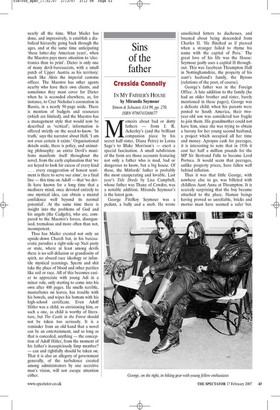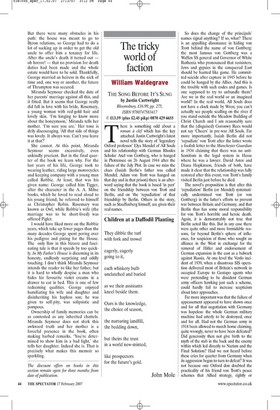Sins of the father
Cressida Connolly IN MY FATHER'S HOUSE by Miranda Seymour Simon & Schuster, £14.99, pp. 270, ISBN 9780743268677 Memoirs about bad or dotty fathers — from J. R. Ackerley's (and the brilliant companion piece by his secret half-sister, Diana Petre) to Lorna Sage's to Blake Morrison's — exert a special fascination. A small subdivision of the form are those accounts featuring not only a father who is mad, bad or dangerous to know, but a big house. Of these, the Mitfords' father is probably the most exasperating and lovable. Last year's Title Deeds by Lisa Campbell, whose father was Thane of Cawdor, was a notable addition. Miranda Seymour's is the latest gem.
George FitzRoy Seymour was a pedant, a bully and a snob. He wrote unsolicited letters to duchesses, and boasted about being descended from Charles II. 'He flinched as if pierced when a stranger failed to rhyme his name with the capital of Peru.' The great love of his life was the House: Seymour justly uses a capital H throughout. This was Jacobean Thrumpton Hall in Nottinghamshire, the property of his aunt's husband's family, the Byrons (relations of the poet, of course).
George's father was in the Foreign Office. A late addition to the family (he had an older brother and sister, barely mentioned in these pages), George was a delicate child; when his parents were posted to South America, their twoyear-old son was considered too fragile to join them. His grandmother could not have him, since she was trying to obtain a barony for her young second husband, a project which occupied all her time and money. Apropos cash for peerages, it is interesting to note that in 1936 it cost her half a million pounds for the MP Sir Bertrand Falle to become Lord Portsea. It would seem that peerages, unlike property prices, have fallen well behind inflation.
Thus it was that little George, with nowhere else to go, was billeted with childless Aunt Anna at Thrumpton. It is scarcely surprising that the boy became attached to the place. Human beings having proved so unreliable, bricks and mortar must have seemed a safer bet.
But there were many obstacles in his path: the house was meant to go to Byron relations, so George had to do a lot of sucking up in order to get the old uncle to offer him a tenancy for life. After the uncle's death it turned out — oh horror! — that no provision for death duties had been made and the whole estate would have to be sold. Thankfully, George married an heiress in the nick of time and, one way or another, the future of Thrumpton was secured.
Miranda Seymour checked the date of her parents' marriage against all this, and it fitted. But it seems that George really did fall in love with his bride, Rosemary, a young woman with red-gold hair and lovely skin. 'I'm longing to know more about the honeymoon,' Miranda tells her mother. 'I'm sure you are.' Her tone is drily discouraging. 'All that side of things was lovely. It always was. Can't you leave it at that?'
She cannot. At this point, Miranda Seymour seems excessively, even unkindly prurient. But in the final quarter of the book we learn why. For the last years of his life, George took to wearing leather, riding large motorcycles and keeping company with a young man called Robbie. At least, that was his given name: George called him Tigger, after the character in the A. A. Milne books, which he loved to read aloud to his young friend; he referred to himself as Christopher Robin. Rosemary was known as Owl, while Robbie's wife (the marriage was to be short-lived) was offered Piglet.
I would have liked more on the Robbie years, which take up fewer pages than the many decades George spent poring over his pedigree and pining for the House. The only flaw in this bizarre and fascinating tale is that it speeds by too quickly. In My Father's House is disarming in its honesty, endlessly surprising and oddly touching. I don't think Miranda Seymour intends the reader to like her father, but it is hard to wholly despise a man who hides his favourite violet creams in a drawer to eat in bed. This is one of few redeeming qualities. George enjoyed humiliating his wife and daughter and disinheriting his hapless son; he was given to self-pity, was solipsistic and pompous.
Ownership of family memories can be as contested as any inherited chattels. Miranda Seymour does not shirk this awkward truth and her mother is a forceful presence in the book, often making barbed remarks. 'You're determined to show him in a bad light,' she tells her daughter. Indeed she is. That is precisely what makes this memoir so sparkling.
The discount offers on books in this section remain open for three months from date of publication.


























































 Previous page
Previous page